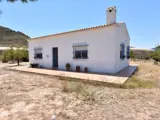Buying a rural property or farmland in Spain

Buying rural land in Spain is a daunting process. You must check all the information you get from the seller. Unfortunately, the seller might not be telling the truth (it happens), or they may not be aware of issues with the property’s documentation. You should contact an independent Spanish rural property surveyor or an attorney before proceeding with the purchase.
Is the Title Deed correct?
You should never buy farmland or rural property if the Title Deed doesn´t exist or is outdated or inaccurate. It would be far better to wait until the vendor has fully updated all the missing details at the Land Registry (at their expense) and then ask your lawyer to check the registry before proceeding with the purchase.
Check that the property in real-life is as it appears in the Land & Cadastral Registries?
Check that the property in real-life is as it appears in the Land & Cadastral Registries
The main discrepancies are typically plot size, inaccurate property description and boundaries. Any discrepancy will bring about legal and financial consequences.
You can check the Cadastral Registry at http://www.sedecatastro.gob.es
Check debts or encumbrances against the property, and property rights
Rural property often has easements unlike urban properties due to its very nature. Common examples are right-of-way, right-of-view and right to extract water.
Is the vendor the registered owner?
This may sound like an obvious point, but you must check that the vendor is the registered owner of the property. There are several legal ways to check this, such as a ‘Nota Simple’, your attorney will assist with this. You can also visit this website, http://registradores.org where you can look up the name of the owner (cost €9 plus €30 for an English translation). This paid service can also provide the information: https://land-registry.es/.
Is the rural property built on land that is legal to build on?
Some owners use ‘casa de aperos’, basically a shed, to get around planning restrictions to build on rural land. A surveyor will determine if a rustic villa does have planning permission from the local Town Hall. If it doesn’t, then we strongly recommend the buyer to walk away to avoid a legal battle. Constructions before 1956 will often be legal as they do not require a building license, but you might not be able to extend the property.
Is the property connected to the mains? Does it have a running water supply and a legal wastewater?
Spotting electricity and running water is easy enough but when it comes to wastewater you could be in for a surprise. Rural properties often have their own septic tanks. These must be emptied every now and then which comes at a cost, and with a renovation you will probably be required to install a modern septic tank which will cost thousands of euro.
